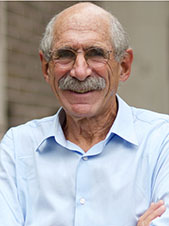Michael Oppenheimer is one of the key contemporary figures working at the boundary of climate science and policy. He is a geoscientist, providing critical scientific expertise on one of humanity’s most pressing problems—climate change, the risks and impacts that climate change entails, and adaptation and other human responses. Oppenheimer is Albert G. Milbank Professor of Geosciences and International Affairs at Princeton University. He received a B.S. in chemistry from M.I.T., a Ph.D. in chemical physics from the University of Chicago and pursued post-doctoral research at the Harvard-Smithsonian Center for Astrophysics.
Oppenheimer is best described as an atmospheric scientist, but this title belies the extraordinary breadth of his scientific work. His research spans a remarkable range of topics, ranging from highly theoretical and observational chemical analyses of interstellar clouds to highly applied work on atmospheric pollution, acid rain, ozone depletion, atmospheric carbon and climate change, and sea-level change. Author of over 200 scholarly articles, he has published in the most prestigious journals of his field, including an extraordinary record of 14 articles in Nature (and its derivative journals Nature Geoscience and Nature Climate Change) and 16 articles in Science. Oppenheimer is co-author of Dead Heat: The Race Against the Greenhouse Effect (1990) and Discerning Experts: The Practices of Scientific Assessment for Environmental Policy (2020).
Over the past two decades, Oppenheimer has played a critical leadership role in the most important international scientific review process ever assembled, the Intergovernmental Panel on Climate Change (IPCC), that won the Nobel Peace Prize in 2007. Most recently, he has served as a coordinating lead author on IPCC’s Special Report on Oceans and Cryosphere in a Changing Climate (2019) and as a review editor on the recently released Sixth Assessment Report. In addition, he has played a leadership role in numerous interdisciplinary reports by the National Academy of Sciences and a variety of leading professional organizations. He also serves as scientific advisor to the Environmental Defense Fund (EDF), a non-governmental, environmental organization. In the late 1980's, Oppenheimer and a handful of other scientists organized two workshops under the auspices of the United Nations that helped precipitate the negotiations that resulted in the United Nations Framework Convention on Climate Change (signed at the 1992 Earth Summit) and the Kyoto Protocol. During that period, he co-founded the Climate Action Network. His research and advocacy work on acid rain also contributed to the passage of the 1990 amendments to the Clean Air Act. In short, he is both a first-rate scholar, a leader of the scientific community, and a public intellectual with the scientific credentials that have allowed him to speak with authority on the major environmental issues of our time.
Michael Oppenheimer is a winner of the 2010 Heinz Award and a fellow of the American Association for the Advancement of Science. He is co-editor-in-chief of the interdisciplinary scientific journal, Climatic Change.


